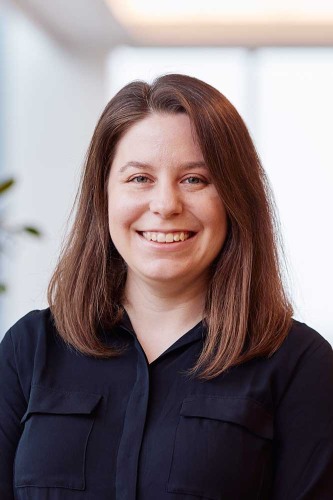A minute with Karianne Bergen
Get to know Karianne, how she accidentally became a data scientist, and her super cool (more like freezing) machine learning research.
Tell us a bit about who you are and what you do at DSI.
I'm Karianne Bergen. I'm an Assistant Professor here in DSI. I also have a joint appointment in the Department of Earth, Environmental and Planetary Sciences (DEEPS) and I'm affiliated with the Department of Computer Science as well.
My research group is called the Scientific Machine Learning Group. We're interested in how machine learning can be used to solve problems in scientific disciplines and in developing new analysis tools that better fit scientists and scientific data.
I have a lot of collaborations with people in earth sciences; I used to work a lot with people in earthquake science, and more recently I've been working more with climate scientists on problems related to sea level rise, emulating ice sheets, and a number of other projects.
How did you find your way to your speciality in scientific machine learning?
When I was an undergrad here at Brown, I studied applied math. At that time, no one was really talking about data science. After I graduated, I got a job as a software engineer trying to figure out how to create algorithms for analyzing data in MATLAB, and it didn’t really feel like software engineering, but it was something that I was enjoying. I ended up deciding to go to grad school where I first heard the term “data science”, which I realized that I had been doing all along.
I was introduced to a geophysicist at Stanford who ended up becoming my PhD advisor. He brought the domain knowledge and I brought the data science knowledge and computational aspects. That's how I got started working with earth scientists, and I found it to be really fun.
There are a lot of interesting and challenging data problems that arise in earth sciences. They have a lot of really large datasets, and they need more people with the skills to both apply existing algorithms and also develop new tools for analyzing their data.
What is a research project you’re excited about right now?
I have several different projects, all in different stages. One of the projects in my group is a collaboration with scientists who are modeling ice sheets. My student Peter Van Katwyk is leading this project.
Our collaborators are doing experiments where they run models with different sets of inputs to try to understand how climate change is going to impact sea level, specifically the contribution from melting ice sheets in Antarctica and Greenland.
But those ice sheet models are really computationally expensive to run. They are really large models that look at all these different physical processes and accurately model the physics. It takes weeks to run these models just one time on a supercomputer.
Our goal is to develop a machine learning model that can emulate those expensive models. So we take the previous model runs, and we use that to train a more compact machine learning algorithm. The machine learning model is really compact. It doesn’t have a huge number of parameters, and we can run it in just a few seconds after it’s been trained. Then we can do additional experimentation that we couldn’t do with the very computationally expensive models.
What do you hope to see or accomplish in the next five years?
One thing that I would like to see is that the area of machine learning for science grows at Brown. There are a number of people who are doing this work in different departments, but it's a bit fragmented. I would be excited to see more of a community. I think it's an area where we're gonna see a lot of potential for new scientific advancements using new tools and training students in this interdisciplinary field.
What is the most rewarding part of the work you’re doing at DSI?
One of the things that I have found really rewarding at DSI is interacting with the undergraduate students. I was an undergrad at Brown, so I think Brown has the best undergraduates. I really like interacting with the students because they're so curious. They have lots of interesting ideas and a passion for what they're doing.
Another thing I’ve done at DSI is the Women in Data Science events. We had a hackathon last year, and we had about 60 students that attended. It was a lot of fun working with graduate students and postdocs to help organize it. We're organizing another WiDS event for this [2024] fall!
What do you like to do for fun?
One thing that I like doing is just going for walks in Providence. It's really pretty here and there's lots of nice outdoor spaces. When I want a break I go for a walk to India Point Park or Blackstone Boulevard. This is a really nice area.
